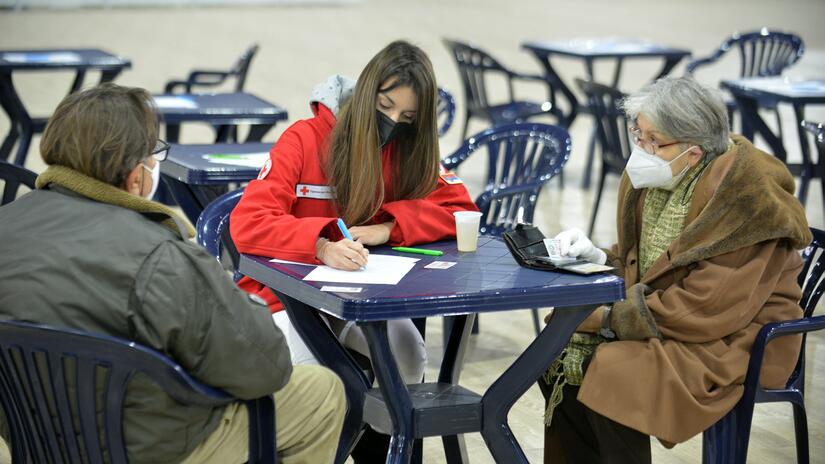By Ainhoa Larrea, IFRC
They are young, they are almost a million strong, and they are leading the humanitarian response against COVID-19 in Europe.
More than 850,000 young volunteers of National Red Cross and Red Crescent Societies across Europe are making a difference for millions of people affected by the pandemic, despite being increasingly affected as the Delta variant spreads.
Many are becoming sick and being hospitalised, as the young are often the last to be vaccinated. In addition, they are disproportionately impacted by the socio-economic consequences of the pandemic, from unemployment to mental health problems. However, they are still stepping up to help.
Daria Tkachenko, a university student, is volunteering with Russian Red Cross in her free time. She visits older people who cannot leave their homes, delivering medicines and groceries.
“I remember well one of the women. She was a home front worker during World War II and served as a volunteer at a local branch of Russian Red Cross for years. She is a very active woman who always shines with optimism and joy; even now, when she is bedridden,” Daria said.
“Living in isolation amid the pandemic is a big challenge for many older people, and not only for them, but also for relatives who cannot help their loved ones. That is why volunteering is so important.”
She is also helping replenish low blood stocks. “Hospitals are in need of blood donors and blood components. I am proud that I donated blood, which in the future may save someone's life.”
Ludovica, a 27-year-old psychologist, spent last Christmas on one of the Italian Red Cross boats where those arriving in Italy by sea undergo mandatory isolation and COVID-19 testing. She provided critical mental health support to migrant and refugee children.
“During the time I was on board, there were 51 children mostly from North Africa and the Middle East. I organised educational and recreational activities with them: Italian language, card games, dance.
“I had to carry out most of the activities at a distance, behind a desk. The most valuable moments were those when I was close to the children. I would then play the role of the white wizard, as the safety protocol obliged me to dress in a white jumpsuit, mask, gloves, goggles, cap and boot covers,” Ludovica said.
Scientific evidence shows vaccination saves lives, but some young people are still unsure whether to get a jab or not. The Red Cross Red Crescent European Youth Network is playing its part with a joint social media campaign with the International Federation of Red Cross and Red Crescent Societies (IFRC). Participants encourage their peers to get immunised, sharing that the main side effect of COVID-19 vaccines is “a feeling of hope and solidarity.”
Other young people are directly involved in vaccination roll-outs. Srna Spasojevic, 15 years old, is one of the youngest volunteers of the Red Cross of Serbia. Every working day, from eight in the morning until 6pm, she updates the lists of those waiting to get immunised in the Novi Sad Fair.
“Sometimes you realise, when you are having a hard time, that there are others who are going through even worse. I am happy to be able to contribute to our country’s battle against the coronavirus,” Srna said.
There are many more young role models among the 54 National Red Cross and Red Crescent Societies in Europe, each one helping to protect communities and to stop the COVID-19 pandemic.
Article
World Radio Day: How radio helps keep communities healthy and safe
World Radio Day: How radio helps keep communities healthy and safe
| Article

